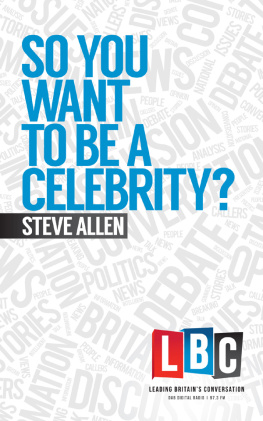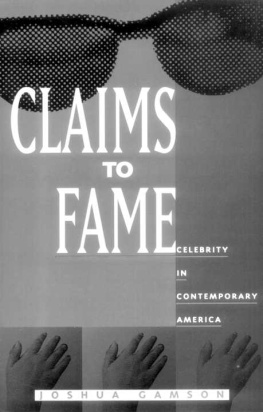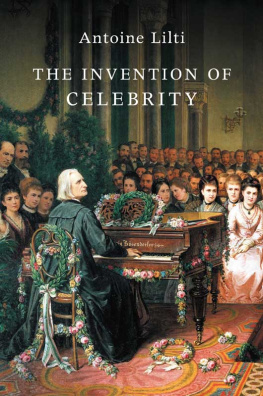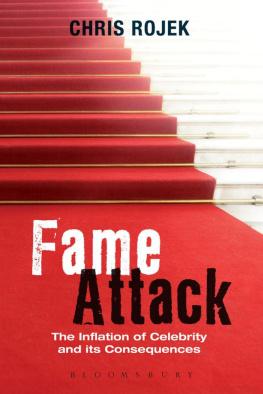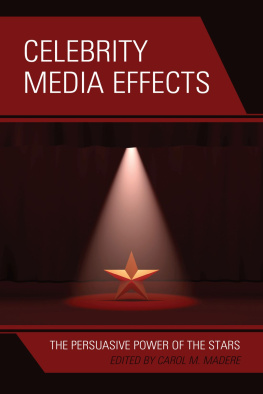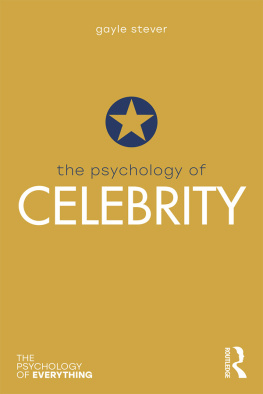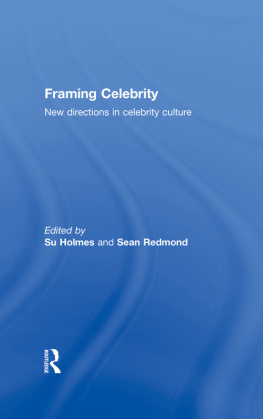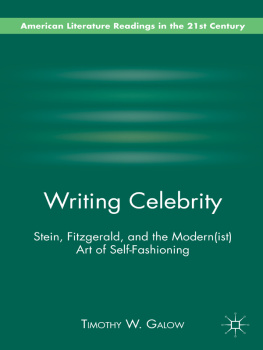
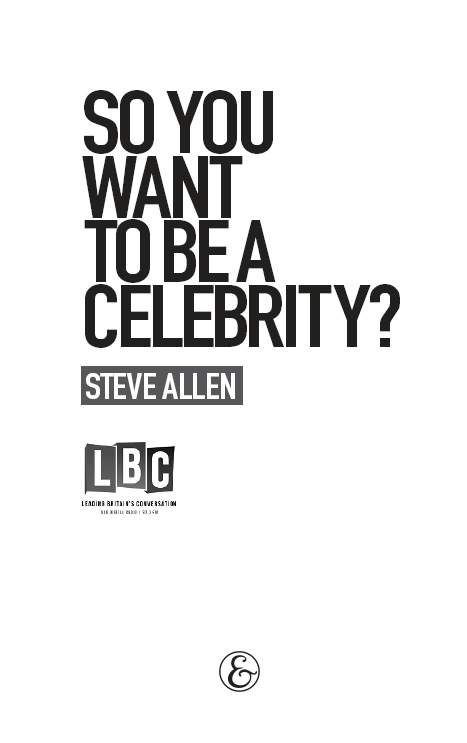
First published 2015 by
Elliott and Thompson Limited
27 John Street
London WC1N 2BX
www.eandtbooks.com
Epub: 978-1-78396-108-5
MOBI: 978-1-78396-109-2
Text Steve Allen 2015
The views expressed in this book are the views of the author and do not necessarily reflect the views of Global Radio.
All rights reserved. No part of this publication may be reproduced, stored in or introduced into a retrieval system, or transmitted, in any form, or by any means (electronic, mechanical, photocopying, recording or otherwise) without the prior written permission of the publisher. Any person who does any unauthorised act in relation to this publication may be liable to criminal prosecution and civil claims for damages.
A catalogue record for this book is available from the British Library.
Managing Editor, LBC: James Rea
Deputy Managing Editor, LBC: Tom Cheal

Contents
Introduction
First, a declaration: I am not a celebrity, I have never been a celebrity, I have no desire to become a celebrity. I have my own radio programme, Ive been on the telly now and again, Ive done a one-man show and other bits and pieces. What I am is a professional presenter. A celebrity is something quite different.
The most obvious example of modern celebrity is Jordan. She was once famous for doing something, but I cant imagine many people remember what it was (it was Page Three classy). These days, her most recent desperate attempt to stay relevant, or at least noticed, was to scream about her current husband (Kieran, at the time of writing) having had affairs with two women. Poor Kieran cant help himself though, because hes a sex addict, so shell forgive him. The women, on the other hand, she has slated as home-wrecking tramps. They slept with her husband while she was pregnant. How low can they go? Jordan doesnt seem to consider that they might have sex addiction problems of their own. Or that Kieran may just be a bit of a dog. Not that any of it matters whats important to Jordan is that its another bit of her life she can sell to the papers.
Celebrity, as a concept, is nothing new. In Roman times an emperor would have his head on coins, and that was a kind of fame, a type of celebrity, because it meant people knew who he was and what he looked like. Then, in time, the most successful gladiators got to have their faces on coins too and, looking back, we can see where celebrity began. Years later, Henry VIII would have audiences at Hampton Court who would pay money to stand behind a barrier and watch him eat. They couldnt address him, they couldnt interrupt him, they just paid their money and stood there, watching a man their king eat. These days, the modern equivalent is probably Prince Charles banquets for the Princes Trust benefactors. They pay a lot of money and they get to watch their prince possibly their future king eat. Its the same thing, except that he probably talks to them, and they get to eat too, which is a nice improvement.
It may go back further than the Romans its quite possible that there were caveman celebrities. Whos to say that whoever did the best bison cave-paintings wasnt a celebrated and feted person, sitting at the mouth of their cave, accepting freshly slaughtered woolly mammoth from the less talented. The point is, there has been a human desire for some kind of fame, of recognition, for as long as there has been humankind.
What were talking about here is the most recent, modern, twenty-first century version.
1
What do I mean by celebrity?
By celebrity I mean the current phenomenon of being famous for being famous. A person who started off as someone ordinary, someone any of us could know, someone who could live next door to you. Someone who doesnt necessarily have any skills or talents for the kind of things that would traditionally have led to fame. The person on the celebrity panel game who makes you think, Who the hell is that? This is a modern celebrity. This is what, it seems, anyone can be. As long as theyre prepared to put in the work.
This particular breed of celebrity probably started with Viv Nicholson in 1961. She famously won 152,319 on the football pools (a way of betting on the outcome of several football matches on one day) and when asked what she would do with it, declared loudly that she would Spend, spend, spend! The papers loved her devil-may-care attitude, which went against the grain at a time when nobody had any money. The press followed her every move the shopping trips, the holidays. The truth was, her husband had actually won the money and, until his death four years later, he kept her under control. After he died, though, she was on her own and, within a short time, she had spent what today would be 2.87 million, and was declared bankrupt. But shed had a taste, and over the next couple of decades she kept desperately trying to rekindle the fame she had relished. She recorded a single (called Spend, Spend, Spend), sang Big Spender! in strip clubs and wrote an autobiography. In the late nineties, a musical based on her life ran successfully in the West End, giving her notoriety her celebrity one more spin.
We also had The Krays, who, had they ever left prison, would certainly have had their own celebrity. As it was, they were the stuff of legend, with people saying how theyd never hurt their own, seemingly not caring that theyd hurt, and even killed, people who were somebody elses.
And then there were the Great Train Robbers, who were famous for stealing the equivalent of 46 million from a Royal Mail train, and bashing the driver over the head with a metal bar. It was 1963, and already celebrity was coming in the strangest of forms. There was a film about one of them, Buster Edwards. He was played by Phil Collins and it was quite a big deal of a film, but I still used to see him every day at Waterloo Station, selling flowers. I thought that must make him happy, but then I wondered if he missed his exciting life of crime, and thats why he ended up hanging himself in a lock-up garage. This would be our first hint that a certain kind of celebrity may not always be that great.
In the 1980s, Cynthia Payne Madame Cyn, as the press called her was famous for running a brothel in suburban south London. She was very good on chat shows and her naughtiness titillated a nation raised on Carry On films. How much of what she said was true we never got to grips with, but nobody seemed to mind, and of course the story eventually culminated in a film about her, Personal Services, starring Julie Walters. It was a good film, and Cynthia seems to have been content with her allotted time in the spotlight. She faded politely from our consciousness without embarrassing herself.
And so to now, the twenty-first century, ushered in by the BBCs Castaway 2000, which was the first programme where they sent people away in this case for a year, to a remote Scottish island. We have to assume these people didnt want to become celebrities, that their intention was to take part in a fascinating experiment, but, as we know, thats not how it ended. One person caught the publics imagination and lo, we had our first reality-TV star in Ben Fogle. His family werent new to public attention as his mother had been famous; shed starred with Tommy Steele in Half a Sixpence back in 1967. So maybe that helped, but whether it did or not, Ben Fogle was the first real breakthrough reality star, and the TV channels were quick to realise how compelling and cheap this kind of television could be.
Next page
